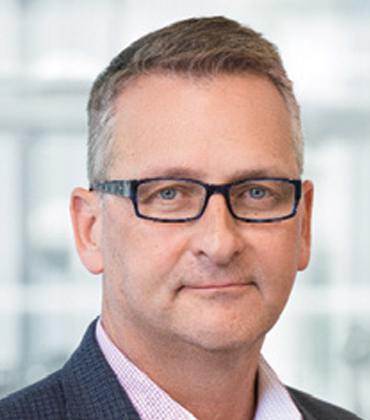THANK YOU FOR SUBSCRIBING
By Colin Nolan, Vice President of Wine Operations, Constellation Brands
Business Performance Improvement - People, Systems, or...
By Liliana Caimacan, Head of Global Innovation, Tata Global Beverages
Future Proofing Through Innovation
By Jeff Pinc, AVP Sales, Sports and Entertainment, Food Service Management, Global Accounts, Oracle
The Jetsons' Stadium of the Future
By Dan Simpson, Chief Executive Officer, Taziki's Mediterranean Cafe
Why Restaurant Industry Needs a Fully Integrated and...

Tech-Driven Hospitality: Innovation Meets Sustainability
Kevin Vassout, Executive Director- Strategy, Sustainability, Transformation And New Countries, Procurement Europe North Africa, Accor

 Kevin Vassout, Executive Director- Strategy, Sustainability, Transformation and New Countries - Procurement Europe & North Africa, Accor
Kevin Vassout, Executive Director- Strategy, Sustainability, Transformation and New Countries - Procurement Europe & North Africa, AccorKey Career Milestones
I have a procurement background, starting in the automotive industry, then moving into IT and telecommunications, and now hospitality. My transition into culinary and beverage management happened through procurement—somewhat by accident. However, I am now discovering many new aspects of this field and thoroughly enjoying the journey.
Data And Guest Experience
1. Enhancing Customer Satisfaction And Retention:
• Accor uses tools like the Voice of the Guest (VOG) and TrustYou to track and measure guest satisfaction through surveys and online reviews. This helps identify pain points in the guest journey and allows for timely interventions to improve the experience.
• Reputation management tools help monitor online feedback and manage guest reviews, which is essential for building longterm relationships and driving guest loyalty.
2. Personalizing Guest Experiences:
• Data analytics enables Accor to capture and analyze data linked to hotel activities, such as emotion detection and VIP management at hotel arrival. This allows for personalized services and enhances the overall guest experience.
• AI tools, such as chatbots and ZenDesk AI, help handle routine queries efficiently, reducing response times and allowing staff to focus on more complex issues.
3. Driving Operational Efficiency:
• AI solutions and data analytics are leveraged to streamline routine customer interactions, improving efficiency and reducing costs. For example, AI chatbots can handle routine queries, enabling the team to focus on more complex issues.
• Accor's data strategy includes capturing all data linked to hotel activities and making it available for actionable services on demand. This ensures that data is accessible and can be used to improve operational efficiency.
4. Supporting Strategic Decision-Making:
• Data analytics provides insights that support strategic decision-making. For instance, Accor's data strategy involves evaluating and improving the performance of tools like Astore Suite to ensure operational reliability and make informed decisions about future investments.
• Customer insights help Accor understand market trends and customer preferences, enabling the company to develop targeted actions to improve engagement and capture rates for franchisees.
Leveraging Technology For Sustainability In Hospitality
1. Smart Locks And Security Systems:
The hospitality industry is rapidly adopting smart locks to address security concerns and improve guest experiences. These smart locks are designed with sustainability in mind, using recycled materials and ensuring durability to reduce the frequency of replacements and, consequently, the environmental impact.
2. Energy Management Systems:
Advanced energy management systems are being implemented to monitor and optimize energy usage across our properties. These systems help reduce energy consumption and lower carbon footprints by automatically adjusting lighting, heating, and cooling based on occupancy and usage patterns.
3. Sustainable Architecture And Design:
Accor's architecture practice supports end-to-end highquality delivery by leveraging architects from business to field operations. This approach ensures that sustainability is integrated into the design and construction of our properties, promoting energy efficiency and reducing environmental impact.
4. Biodiversity Integration:
We are actively integrating biodiversity considerations into the planning and execution of our projects. This includes creating habitats, preserving local flora and fauna, and enhancing green spaces within our properties. These efforts are part of our commitment to promoting and preserving local identities and fostering sustainable transformation at a system level.
5. Ethical And Responsible Operations:
Accor is committed to setting industry standards for ethical and responsible operations. We strive to make every stay a contribution to society and the environment by promoting cross-sector initiatives and encouraging sustainable behaviors among our stakeholders.
“Technology should enhance, not replace, the human touch that defines hospitality. Use technology to streamline operations and free up staff to focus on providing personalized service”
Technology Trends Shaping the Future of Hospitality
1. Contactless Technology:
The adoption of contactless technology is on the rise, driven by the need to reduce friction for guests and meet them on devices and channels where they spend most of their time. This includes contactless check-in kiosks, keyless entry, and guest messaging platforms.
2. Artificial Intelligence and Machine Learning:
AI and machine learning are revolutionizing direct selling and hyper-personalization in the hospitality industry. These technologies reshape hotel marketing, enhance guest experiences, and drive profitability by providing personalized services and recommendations.
3. Digital Twins:
Digital twins are being used to create virtual replicas of physical assets, allowing hotels to optimize operations, predict maintenance needs, and enhance guest experiences. This technology is expected to play a significant role in the future of hotel management.
4. Biometrics Payment Technology:
Biometric payment technology, such as facial recognition and fingerprint scanning, is emerging as a trend in the hospitality industry. This technology will soon be used to process payments and give select employees access to computers or cash registers, enhancing security and convenience.
5. Sustainability and Green Technology:
The hospitality industry has a growing demand for green products and sustainable practices. Technologies promoting energy efficiency, reducing waste, and recycled materials are becoming increasingly important. For example, designing durable locks with a longer lifespan minimizes the frequency of replacements and the environmental impact.
Advice for Decision-Makers
1. Prioritize Guest Experience:
Technology should enhance, not replace, the human touch that defines hospitality. Use technology to streamline operations and free up staff to focus on providing personalized service. For example, smart locks and contactless check-in can reduce friction for guests, allowing staff to spend more time on meaningful interactions.
2. Leverage Data Analytics:
Utilize data analytics to gain insights into guest preferences and behaviors. This can help you tailor services and create personalized experiences that resonate with your guests. Tools like AI-driven personalized hotel websites can offer tailored recommendations based on past consumption.
3. Embrace Sustainability:
Integrate sustainable practices into your operations through technology. Energy management systems, smart lighting, and other green technologies can help reduce your environmental footprint while appealing to eco-conscious guests.
4. Maintain Brand Identity:
Ensure that any technological integration aligns with your brand values and identity. For instance, if your brand is known for its luxurious and personalized service, ensure that technology enhances this perception rather than detracting from it.
5. Invest in Training:
Continuous training is essential to ensure that your staff can effectively use new technologies. This not only improves operational efficiency but also ensures that the technology enhances the guest experience.
Read Also















